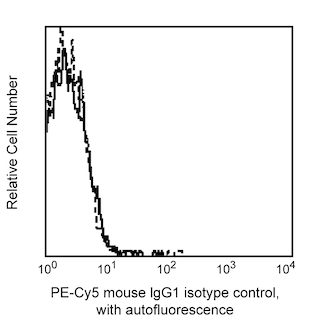-
Your selected country is
Middle East / Africa
- Change country/language
Old Browser
This page has been recently translated and is available in French now.
Looks like you're visiting us from {countryName}.
Would you like to stay on the current country site or be switched to your country?

Profile of HUT78 cells analyzed on a FACScan (BDIS, San Jose, CA)

BD Pharmingen™ PE-Cy™5 Mouse Anti-Human CD90
Regulatory Status Legend
Any use of products other than the permitted use without the express written authorization of Becton, Dickinson and Company is strictly prohibited.
Preparation And Storage
Product Notices
- Since applications vary, each investigator should titrate the reagent to obtain optimal results.
- Please refer to www.bdbiosciences.com/us/s/resources for technical protocols.
- For fluorochrome spectra and suitable instrument settings, please refer to our Multicolor Flow Cytometry web page at www.bdbiosciences.com/colors.
- PE-Cy5 is a tandem fluorochrome composed of R-phycoerythrin (PE), which is excited by the 488 nm light of an Argon ion laser and serves as an energy donor, coupled to the cyanine dye Cy5, which acts as an energy acceptor and fluoresces at 670 nm. BD Biosciences Pharmingen has maximized the fluorochrome energy transfer in PE-Cy5, thus maximizing its fluorescence emission intensity, minimizing residual emission from PE, and minimizing lot-to-lot variation.
- PE-Cy5 is optimized for use with a single argon ion laser emitting 488-nm light. Because of the broad absorption spectrum of the PE-Cy5 tandem fluorochrome, extra care must be taken when using dual-laser cytometers which may directly excite both PE and Cy5™.
- Cy is a trademark of Amersham Biosciences Limited. This conjugated product is sold under license to the following patents: US Patent Nos. 5,486,616; 5,569,587; 5,569,766; 5,627,027.
- This product is subject to proprietary rights of Amersham Biosciences Corp. and Carnegie Mellon University and made and sold under license from Amersham Biosciences Corp. This product is licensed for sale only for research. It is not licensed for any other use. If you require a commercial license to use this product and do not have one return this material, unopened to BD Biosciences, 10975 Torreyana Rd, San Diego, CA 92121 and any money paid for the material will be refunded.
- Caution: Sodium azide yields highly toxic hydrazoic acid under acidic conditions. Dilute azide compounds in running water before discarding to avoid accumulation of potentially explosive deposits in plumbing.
The 5E10 monoclonal antibody specifically binds to human CD90 which is also known as Thy-1. CD90 is a 25-35 kDa glycophosphatidylinositol-anchored membrane glycoprotein of the Ig superfamily that is expressed on 1-4% of human fetal liver cells, cord blood cells, and bone marrow cells. The anti-CD90 antibody binds to a subset of immature CD34+ cells and a distinct subset of mature CD34- cells that are CD3+CD4+. The CD90+CD34+ population is highly enriched for cells capable of long-term culture. The anti-CD90 antibody is useful for enriching high proliferative potential colony-forming cells (HIPP-CFC) that are primative progenitor cells.

Development References (5)
-
Baum CM, Weissman IL, Tsukamoto AS, Buckle AM, Peault B. Isolation of a candidate human hematopoietic stem-cell population. Proc Natl Acad Sci U S A. 1992; 89(7):2804-2808. (Biology). View Reference
-
Craig W, Kay R, Cutler RL, Lansdorp PM. Expression of Thy-1 on human hematopoietic progenitor cells. J Exp Med. 1993; 177(5):1331-1342. (Biology). View Reference
-
Knapp W. W. Knapp .. et al., ed. Leucocyte typing IV : white cell differentiation antigens. Oxford New York: Oxford University Press; 1989:1-1182.
-
Lansdorp PM, Thomas TE. AP Gee, ed. Bone Marrow Processing and Purging. Boca Raton FL: CRC Press; 1991.
-
Schlossman SF. Stuart F. Schlossman .. et al., ed. Leucocyte typing V : white cell differentiation antigens : proceedings of the fifth international workshop and conference held in Boston, USA, 3-7 November, 1993. Oxford: Oxford University Press; 1995.
Please refer to Support Documents for Quality Certificates
Global - Refer to manufacturer's instructions for use and related User Manuals and Technical data sheets before using this products as described
Comparisons, where applicable, are made against older BD Technology, manual methods or are general performance claims. Comparisons are not made against non-BD technologies, unless otherwise noted.
For Research Use Only. Not for use in diagnostic or therapeutic procedures.
Report a Site Issue
This form is intended to help us improve our website experience. For other support, please visit our Contact Us page.
